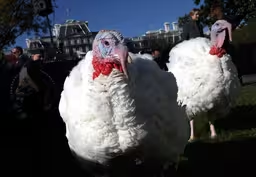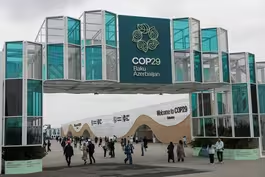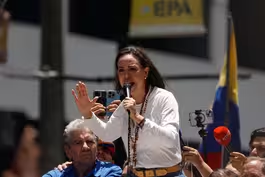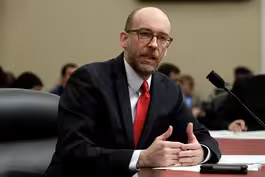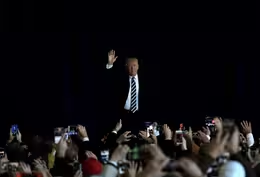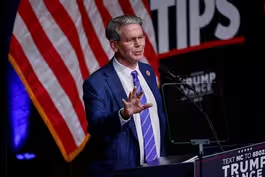
Tamara Keith and Amy Walter on dismissal of Trump's cases
Clip: 11/25/2024 | 8m 40sVideo has Closed Captions
Tamara Keith and Amy Walter on the dismissal of Trump's federal criminal cases
NPR’s Tamara Keith and Amy Walter of the Cook Political Report with Amy Walter join William Brangham to discuss the latest political news, including the major federal felony cases against President-elect Trump are dropped, Trump's success with young men and the electoral gender divide.
Problems playing video? | Closed Captioning Feedback
Problems playing video? | Closed Captioning Feedback
Major corporate funding for the PBS News Hour is provided by BDO, BNSF, Consumer Cellular, American Cruise Lines, and Raymond James. Funding for the PBS NewsHour Weekend is provided by...

Tamara Keith and Amy Walter on dismissal of Trump's cases
Clip: 11/25/2024 | 8m 40sVideo has Closed Captions
NPR’s Tamara Keith and Amy Walter of the Cook Political Report with Amy Walter join William Brangham to discuss the latest political news, including the major federal felony cases against President-elect Trump are dropped, Trump's success with young men and the electoral gender divide.
Problems playing video? | Closed Captioning Feedback
How to Watch PBS News Hour
PBS News Hour is available to stream on pbs.org and the free PBS App, available on iPhone, Apple TV, Android TV, Android smartphones, Amazon Fire TV, Amazon Fire Tablet, Roku, Samsung Smart TV, and Vizio.
Providing Support for PBS.org
Learn Moreabout PBS online sponsorshipWILLIAM BRANGHAM: As the major federal felony cases against him get dropped, president-elect Trump is rapidly filling up his Cabinet.
For that and for more, we turn to our Politics Monday duo.
That is Amy Walter of The Cook Political Report With Amy Walter and Tamara Keith of NPR.
So nice to see you both in your fabulous color coordination or not coordination.
(CROSSTALK) AMY WALTER, The Cook Political Report: We did not coordinate it at all, but it works.
TAMARA KEITH, National Public Radio: Yes.
WILLIAM BRANGHAM: Tam, I want to start with you.
This news today that -- we knew that this was going to happen, but that the felony charges against Donald Trump have gone away, that -- this die was obviously cast on the night of the election, but there was all of this considerable evidence, will now never be heard by any jury.
What do you make of all that.
TAMARA KEITH: This is a validation of the legal plan that Trump's team had.
They were running out the clock.
They had been running out the clock since before charges were even filed.
And, in essence, this -- although Vice President Harris and others didn't really talk about this as being part of the campaign, it really was part of the campaign.
He was the nominee in large part because Republicans consolidated behind him after the search of Mar-a-Lago.
That really closed off a path for some of the competition.
So this is integral to this election.
And this is -- elections have consequences and this is what -- this is the result.
AMY WALTER: You know, what's also really fascinating to think over the course of these four years, there were so many different inflection points where the outcome of this could have looked different.
There was, of course, the February 2021 impeachment, had more Republicans voted to impeach.
That's a decision on January 6.
You obviously have the Justice Department that there were a lot of delays in getting this... WILLIAM BRANGHAM: A lot of delays.
AMY WALTER: A lot of delays in getting this investigation started.
Maybe had it started sooner, we wouldn't be talking about it in 2024.
And then, of course, you have the immunity decision by the Supreme Court, along with Trump's ability to really draw things out.
So, at every step of the way, we could have had a different outcome.
And, obviously, we knew going into this election that the outcome essentially of this case would be determined by whatever happened on election night.
WILLIAM BRANGHAM: I'm curious, do either of you think that Harris' decision not to focus on this more could have made a difference?
Or is that just, they assume that this is baked in, that people know that Donald Trump in January 6, that he's responsible for that?
TAMARA KEITH: Yes, it's not just that she didn't talk about the legal cases.
When her supporters would start chanting, "Lock him up," which they did regularly during the campaign, she would cut them off.
And she would say, no, that's for the courts to decide.
I think that that was an acknowledgement of the political toxicity of these cases, that the cases actually engaged and riled up Trump voters, and that her base wasn't necessarily voting on that alone.
WILLIAM BRANGHAM: Right.
TAMARA KEITH: Yes.
AMY WALTER: I mean, it was -- it's also amazing when you talk to the Trump campaign, the inflection point that was those indictments, right?
TAMARA KEITH: Yes.
AMY WALTER: I mean, they will argue, we already had momentum going into the primaries.
But those first indictments helped to shore up his base.
And that base has never left him.
WILLIAM BRANGHAM: Right.
AMY WALTER: And that's also, again, one of the many decision points along the way.
WILLIAM BRANGHAM: I want to turn back to Laura's piece that she just did about this -- quote, unquote -- "manosphere" and just the incredibly effective way that Trump reached out to these young men online, the way he did it, and their incredible reception to the way Trump was making his pitch to them.
How do you see that dynamic?
TAMARA KEITH: There was a large part of the electorate this cycle who were actively avoiding political news.
They did not want to think about politics.
They were not seeking it out.
WILLIAM BRANGHAM: They weren't watching Politics Monday?
TAMARA KEITH: They were not watching Politics Monday.
They -- yes, unless we accidentally came through their TikTok feed somehow.
(LAUGHTER) TAMARA KEITH: But -- so people were actively avoiding politics.
Both campaigns were trying to crack the code on how do you reach people who don't want to be reached?
What Trump figured out is, you go on these bro podcasts that are not political podcasts.
They are podcasts about other things.
WILLIAM BRANGHAM: Right.
TAMARA KEITH: And then the politics just sort of seeps in.
It finds people in their natural environment where they're avoiding politics and it introduces politics at a time when they are open to suggestion.
And all along, we were talking about how this was sort of a risky strategy, because young men are not regular voters.
They're not regular voters.
Well, he got them engaged.
He found them on their podcasts and in the TikTok feeds, and he got them engaged enough to vote for him.
It's not clear that they voted downballot necessarily.
AMY WALTER: You know, I have been talking to a lot of folks who study this both before, during and then after this election.
And it is -- this Gen Z gender divide is really quite fascinating, and it goes much beyond our politics.
I mean, there definitely was a gender divide on Election Day, the kind of which we had never seen before in a place like Pennsylvania.
Among the youngest cohort of voters, the gender gap was 62 points.
WILLIAM BRANGHAM: Yes.
AMY WALTER: Just to put that in context, the overall gender gap was like 25 or 26 points in that state.
WILLIAM BRANGHAM: That's incredible.
AMY WALTER: What we see -- what we're seeing right now is that more and more of these young men are using these sites, whether it's TikTok or the podcasts or YouTube as a way to build community.
This is a generation of young men who feel very disconnected, who feel very lost, who feel left behind.
And these are the places that they go to find that community.
What I noticed as well is, it's not just that Trump went to those places, but the organic way in which conversations that started off about sports or video games would also then lead into the host themselves talking about, oh, hey, did you see Trump go into McDonald's?
Did you see Trump was at the fight?
(CROSSTALK) WILLIAM BRANGHAM: The UFC fight.
AMY WALTER: The UFC thing.
And so he became part of it, even though - - so we know this.
The best candidates are able to meet voters where they are, and that's what he was able to do.
WILLIAM BRANGHAM: Do you think, Tam, it's a fair criticism that's been made against Harris that she didn't more actively do that didn't, go on "Joe Rogan," say?
TAMARA KEITH: Right.
She didn't go on Joe Rogan.
They were in negotiations.
It didn't work out.
Ultimately, Rogan said that he was offered a one-hour interview.
He wanted three and that he would have to come to Washington and not have it in his studio.
She did go in spaces that are not normal places for politicians to go.
She did go on podcasts.
Her vice presidential nominee also went on podcasts.
Also, if you remember, in the very early stages of her campaign, there was the coconut tree meme and there was brat summer and all of this stuff.
And a lot of that was organic.
But in the end, it sort of faded out.
And also at the same time, the Harris campaign was more cautious.
I mean, Trump went on podcasts that she definitely wouldn't go on just because like you don't know what these guys are going to say.
WILLIAM BRANGHAM: Sure.
Sure.
It's incredibly risky.
TAMARA KEITH: Yes.
AMY WALTER: Yes.
And, again, I think it comes back to that authenticity piece.
TAMARA KEITH: Yes.
AMY WALTER: I mean, when you saw her numbers really spike, it was when the coconut memes and all the brat stuff was happening because what younger people were seeing was, oh, this is something I can relate to.
This is something that's interesting.
As soon as she became more of a traditional candidate, as soon as it was about rolling out white papers and putting policy into place, there wasn't that same connection to her among those same younger voters.
And even among younger women, there was a shift to the right in this election.
She still overwhelmingly won those women, but they were not connecting with her in the same way that younger men were connecting with Trump.
WILLIAM BRANGHAM: Amy Walter and Tamara Keith, so nice to see you both in your visions of red.
Have a great Thanksgiving.
WILLIAM BRANGHAM: Thanks for being here.
Biden grants final pardons to turkeys at the White House
Video has Closed Captions
Clip: 11/25/2024 | 3m 30s | Biden grants final pardons to turkeys at the White House (3m 30s)
Climate deal reached but developing nations 'not satisfied'
Video has Closed Captions
Clip: 11/25/2024 | 6m 56s | Developing nations leave UN climate conference with deal but say 'we're not satisfied' (6m 56s)
Opposition leader says Maduro is weak and desperate
Video has Closed Captions
Clip: 11/25/2024 | 8m 18s | Venezuela’s opposition leader says Maduro is 'weak' and 'desperate' amid crackdown (8m 18s)
Trump names Project 2025 architect to key White House role
Video has Closed Captions
Clip: 11/25/2024 | 4m 24s | Trump names Project 2025 architect Russell Vought to key White House role (4m 24s)
Trump’s success among men illustrates manosphere's influence
Video has Closed Captions
Clip: 11/25/2024 | 8m 41s | Trump’s success among young men illustrates influence of online 'manosphere' (8m 41s)
What Trump's appointments tell us about his economic agenda
Video has Closed Captions
Clip: 11/25/2024 | 6m 16s | What Trump's economic appointments tell us about his 2nd-term agenda (6m 16s)
Providing Support for PBS.org
Learn Moreabout PBS online sponsorshipSupport for PBS provided by:
Major corporate funding for the PBS News Hour is provided by BDO, BNSF, Consumer Cellular, American Cruise Lines, and Raymond James. Funding for the PBS NewsHour Weekend is provided by...
